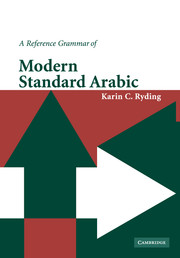Book contents
- Frontmatter
- Contents
- Preface
- List of Abbreviations
- Acknowledgments
- 1 Introduction to Arabic
- 2 Phonology and script
- 3 Arabic word structure: an overview
- 4 Basic Arabic sentence structures
- 5 Arabic noun types
- 6 Participles: active and passive
- 7 Noun inflections: gender, humanness, number, definiteness, and case
- 8 Construct phrases and nouns in apposition
- 9 Noun specifiers and quantifiers
- 10 Adjectives: function and form
- 11 Adverbs and adverbial expressions
- 12 Personal pronouns
- 13 Demonstrative pronouns
- 14 Relative pronouns and relative clauses
- 15 Numerals and numeral phrases
- 16 Prepositions and prepositional phrases
- 17 Questions and question words
- 18 Connectives and conjunctions
- 19 Subordinating conjunctions: the particle ʾinna and her sisters
- 20 Verb classes
- 21 Verb inflection: a summary
- 22 Form I: The base form triliteral verb
- 23 Form II
- 24 Form III triliteral verb
- 25 Form IV triliteral verb
- 26 Form V triliteral verb
- 27 Form VI triliteral verb
- 28 Form VII triliteral verb
- 29 Form VIII triliteral verb
- 30 Form IX triliteral verb
- 31 Form X triliteral verb
- 32 Forms XI–XV triliteral verb
- 33 Quadriliteral verbs
- 34 Moods of the verb I: indicative and subjunctive
- 35 Moods of the verb II: jussive and imperative
- 36 Verbs of being, becoming, remaining, seeming (kaan-a wa-ʿ axawaat-u-haa)
- 37 Negation and exception
- 38 Passive and passive-type expressions
- 39 Conditional and optative expressions
- Appendix I: How to use an Arabic dictionary
- Appendix II: Glossary of technical terms
- References
- Index
5 - Arabic noun types
Published online by Cambridge University Press: 05 May 2012
- Frontmatter
- Contents
- Preface
- List of Abbreviations
- Acknowledgments
- 1 Introduction to Arabic
- 2 Phonology and script
- 3 Arabic word structure: an overview
- 4 Basic Arabic sentence structures
- 5 Arabic noun types
- 6 Participles: active and passive
- 7 Noun inflections: gender, humanness, number, definiteness, and case
- 8 Construct phrases and nouns in apposition
- 9 Noun specifiers and quantifiers
- 10 Adjectives: function and form
- 11 Adverbs and adverbial expressions
- 12 Personal pronouns
- 13 Demonstrative pronouns
- 14 Relative pronouns and relative clauses
- 15 Numerals and numeral phrases
- 16 Prepositions and prepositional phrases
- 17 Questions and question words
- 18 Connectives and conjunctions
- 19 Subordinating conjunctions: the particle ʾinna and her sisters
- 20 Verb classes
- 21 Verb inflection: a summary
- 22 Form I: The base form triliteral verb
- 23 Form II
- 24 Form III triliteral verb
- 25 Form IV triliteral verb
- 26 Form V triliteral verb
- 27 Form VI triliteral verb
- 28 Form VII triliteral verb
- 29 Form VIII triliteral verb
- 30 Form IX triliteral verb
- 31 Form X triliteral verb
- 32 Forms XI–XV triliteral verb
- 33 Quadriliteral verbs
- 34 Moods of the verb I: indicative and subjunctive
- 35 Moods of the verb II: jussive and imperative
- 36 Verbs of being, becoming, remaining, seeming (kaan-a wa-ʿ axawaat-u-haa)
- 37 Negation and exception
- 38 Passive and passive-type expressions
- 39 Conditional and optative expressions
- Appendix I: How to use an Arabic dictionary
- Appendix II: Glossary of technical terms
- References
- Index
Summary
Arabic nouns fall into a number of different categories depending on their morphology and their relationship to Arabic lexical roots. The extensive range of noun types yields a wealth of lexical possibilities that contribute to what Charles Ferguson has called the sense of “vastness and richness of the Arabic lexicon.” Two morphological criteria traditionally define Arabic nouns: they can take the definite article and/or they can take nunation.
Most Arabic nouns are derived from triliteral or quadriliteral lexical roots, and all nouns derived from a particular root are found in an Arabic or Arabic–English dictionary clustered under that root entry. Some nouns, however, have restricted roots; certain ones have only two root consonants, others have up to five root consonants. Yet other nouns have solid stems, unanalyzable into roots and patterns. This chapter is intended to give an overview of these noun types, with examples. It is by no means exhaustive and does not go into derivational detail within categories. For inflectional characteristics of nouns, see the chapter on noun inflection.
Arabic nouns are usually derived from lexical roots through application of particular morphological patterns. The use of patterns interlocking with root phonemes allows the formation of actual words or stems. Noun patterns themselves carry certain kinds of meaning, such as “place where action is done,” “doer of action,” “name of action,” or “instrument used to carry out action.” The most frequent MSA noun patterns are as follows.
- Type
- Chapter
- Information
- A Reference Grammar of Modern Standard Arabic , pp. 74 - 101Publisher: Cambridge University PressPrint publication year: 2005

